HRD talks to the global head of diversity at Atlassian about the importance of encouraging each team member to be 'just a bit more inclusive'
.jpg)
One of the most important aspects of D&I that Atlassian focuses on is building what the enterprise software company describes as “balanced teams”.
That’s according to Aubrey Blanche, global head of diversity at Atlassian, who is based in the San Francisco Bay Area.
“At Atlassian, we take an ‘intersectional approach’ which means that we recognise that everyone brings something unique to the table and that people have layers and are not just one identity,” Blanche told HRD.
“Employees are all of the things they bring into the workplace and our goal is to make people show up authentically.”
Blanche’s comments come following recent global research by Atlassian which looked at how respondents understood diversity and what groups were considered part of diversity.
She added that it seems common practice for many employers who want to improve D&I outcomes to start with gender diversity. This is because they feel it concerns a big population and that it’s something they can make significant headway on. However, she said, this approach has a couple of drawbacks.
“The first is that is that it actually creates more of an ‘us’ versus ‘them’ dynamic, when there is something extremely important about ‘we’, she said.
“It can also suggest or communicate that men, for example, are not a part of diversity which certainly they are.”
But on a more practical level, those types of programs tend to benefit straight white economically privileged women often exclusively, Blanche added.
This can mean that companies are actually further marginalising, for example, women who face additional challenges in the workplace on account of their sexual orientation or their cultural backgrounds.
“So by taking a more complex approach, while it may seem counterintuitive, will actually help companies make more progress.”
So what is Atlassian doing in the D&I space that they are particularly proud of?
“My role as leader is to help build the infrastructure and each Atlassian staff member has a part to play,” said Blanche.
“Something that we have rolled out this year which sounds so simple is an internal blog series that’s truly by Atlassian for Atlassian.
“This involves people sharing their stories on how diversity influences their work or simply how their teammates can be more inclusive for people like them.”
Blanche added that once these stories are published a lot of learning comes as a result.
“It helps employees develop and be their best selves because they are learning from their colleagues how to, for example, include transgender teammates or to recognise the specific strengths and challenges that people with autism have in the workplace which means that we can better support them. It also makes us all a little bit more aware.”
It’s important to note that building a balanced set of teams and a culture where people feel like they belong does not happen by accident and it doesn’t happen without intentional effort and investment, added Blanche.
“We really believe in building balance and belonging at the team level and that is one of the reasons why HR generally may not have seen progress - diversity is often talked about only at the corporate level which can be really overwhelming.”
Blanche added that the average frontline worker probably doesn’t know how they can impact the overall corporate culture and diversity of an organisation.
“What we have tried to do is empower our workers simply to create a sense of belonging in their teams,” said Blanche.
“So I think what our industry needs to do is to give people a unit that feels immediate to them so that they know how they can impact because that is actually what creates that larger level corporate change.
“If each person is doing just a little bit to make their team more inclusive then it was yesterday then what you tend to see is fundamental cultural shift.”








